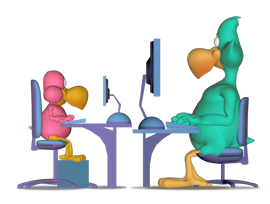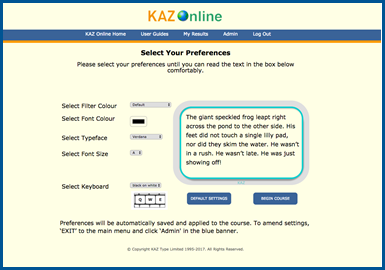The Benefits of Touch Typing for Children (with and without SEN/Dyslexia)
 With computers all around (both at home and at school) and with an ever increasing percentage of coursework and assignments having to be presented in typed format, it has never been more essential to teach children how to touch type. Research has shown that the earlier a child begins, the easier it is for them to master a skill - so the sooner your child learns to touch type, the better!
With computers all around (both at home and at school) and with an ever increasing percentage of coursework and assignments having to be presented in typed format, it has never been more essential to teach children how to touch type. Research has shown that the earlier a child begins, the easier it is for them to master a skill - so the sooner your child learns to touch type, the better!
Additionally, if your child has special educational needs / dyslexia, it is of even more importance that they learn to type – as trials and feedback from special needs teachers across the world have proven that touch typing is a formidable and life changing tool that presents them with a new and powerful medium for learning and communicating - introducing them to a new accessible academic world they can cope in and even excel in - giving them a greater chance to reach their full potential. At home and in the classroom, handwriting and producing a piece  of work can present extremely challenging difficulties and is a commonly disliked task. The level of concentration and effort involved can be exhausting and can often affect the overall structure and quality of a piece of work – causing children to struggle and lag behind in class, lowering moral and self-esteem.
of work can present extremely challenging difficulties and is a commonly disliked task. The level of concentration and effort involved can be exhausting and can often affect the overall structure and quality of a piece of work – causing children to struggle and lag behind in class, lowering moral and self-esteem.
The skill of touch typing can eliminate many of these challenges and frustrations and early acquisition familiarises children with the keyboard, allowing them to fully appreciate the tools available to them through touch typing and using a computer.
When touch typing and using a computer:
- The need for neat handwriting is no longer a priority.
- Errors can be easily corrected without messy crossings out - resulting in neat and presentable work.
- Spell checkers highlight mistakes and offer alternatives.
- Reassurance with the above boosts confidence – promoting experimentation with vocabulary and spelling and allows concentration to be focused on content.
- Quick and accurate touch typing can reduce the amount of time spent on a piece of work and often increases the amount of work produced. Physical dexterity is enhanced - helping handwriting skills.
- Grasping the skill at an early age helps engrain reading, spelling and vocabulary to memory. With ‘muscle memory’, spellings become a series of finger movements and patterns on a keyboard, reducing the likelihood of transposing or misspelling words.
- The working memory is not overloaded - children can work at their own pace in a non-linear fashion, where they can process their thoughts first and structure them later.
The above benefits of touch typing have proven to help alleviate some of the issues experienced by dyslexic children but the disturbances relating to visual stress still posed a problem.
So with this in mind, KAZ Typing Tutor took advice and guidance from Dr. Sue Fowler and her team at the Dyslexia Research Trust, Reading Clinic and Oxford University and further developed their typing tutor, to produce a new SEN/Dyslexia edition that teaches typing skills, whilst addressing disturbances related to visual stress.
The program’s opening ‘Preference Screen’ offers the user a choice of preferences:

- A choice of coloured background/filter screens – for reducing white screen glare.
- A choice of 2 specific research based background/filter colours - for steading letter movement and blurring.
- A choice of dyslexic friendly typefaces – for ease of reading.
- A choice of font colour – for contrast from background screen colour.
- A choice of font size – for optimum visibility comfort and to minimize fusing and crowding of letters.
- A choice of Keyboard – for optimum visibility comfort.
Once the child has selected their preferences and can read the sample text comfortbly, these options are then applied throughout the course, tailor making it to suit their eyes and ensuring the learning experience is a comfortable and enjoyable one.
Although each dyslexic child experiences different disturbances whilst reading, the positives of touch typing have been tried, tested and proven.
KAZ Typing Tutor’s Online ‘Standard Edition’ and NEW ‘SEN/Dyslexia Edition’ allows all children to learn how to touch type at their own pace, at school, at home or wherever they have an internet signal.






















